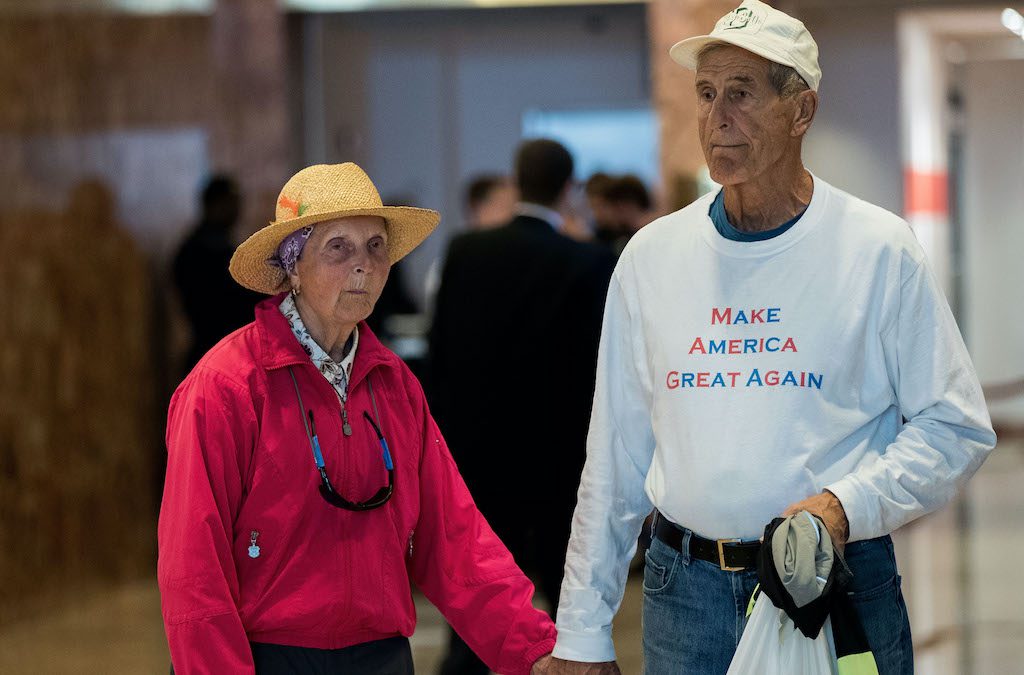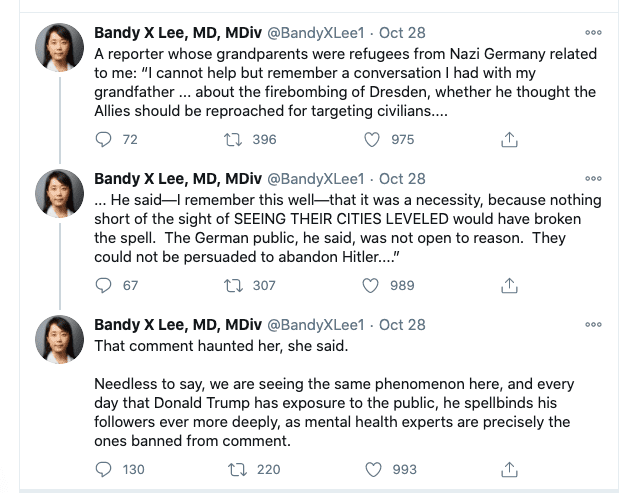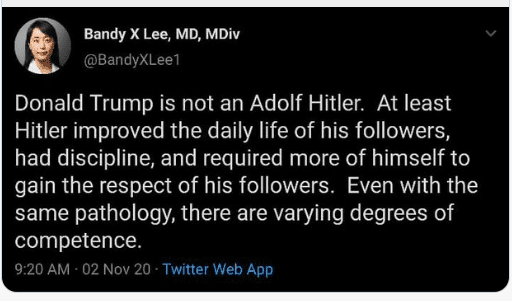Hating Your Mama Over Politics

This Reuters report is so depressing:
When lifelong Democrat Mayra Gomez told her 21-year-old son five months ago that she was voting for Donald Trump in Tuesday’s presidential election, he cut her out of his life.
“He specifically told me, ‘You are no longer my mother, because you are voting for Trump’,” Gomez, 41, a personal care worker in Milwaukee, told Reuters. Their last conversation was so bitter that she is not sure they can reconcile, even if Trump loses his re-election bid.
“The damage is done. In people’s minds, Trump is a monster. It’s sad. There are people not talking to me anymore, and I’m not sure that will change,” said Gomez, who is a fan of Trump’s crackdown on illegal immigrants and handling of the economy.
Gomez is not alone in thinking the bitter splits within families and among friends over Trump’s tumultuous presidency will be difficult, if not impossible, to repair, even after he leaves office.
In interviews with 10 voters – five Trump supporters and five backing Democratic candidate Joe Biden – few could see the wrecked personal relationships caused by Trump’s tenure fully healing, and most believed them destroyed forever.
More:
Gayle McCormick, 77, who separated from her husband William, 81, after he voted for Trump in 2016, said, “I think the legacy of Trump is going to take a long time to recover from.”
The two still spend time together, although she is now based in Vancouver, he in Alaska. Two of her grandchildren no longer speak to her because of her support for Democrat Hillary Clinton four years ago. She has also become estranged from other relatives and friends who are Trump supporters.
She is not sure those rifts with friends and family will ever mend, because each believes the other to have a totally alien value system.
Read it all. What kind of lunatic would tell his own mother that she is dead to him because of her vote for Trump? What kind of monster would leave her husband because he voted for Trump? What kind of broken people would refuse to talk to their grandmother because she voted for Hillary Clinton?
In the story, some people blame Trump for this. Bull. This is on us — every one of us, liberal or conservative, who values politics more than family. That number also includes people who care so little about preserving family bonds that they will not shut up about their personal politics (pro- or anti-Trump) for the sake of respecting others in the family, or friendships.
I cannot imagine caring so much about politics that I would cut off a friend or family member. I don’t make friends on the basis of politics, so why would I cease being friends with someone I otherwise cared about, because they came to a different political conclusion. I mean, yeah, if it were Germany 1934 or Russia 1917. But we aren’t there. We get there more quickly by becoming the sort of people who value politics more than friends and family.
Here’s a great reflection by Ian Marcus Corbin on what we have become, and what we might be if we turn back from it. Excerpts:
America, as a community, is convulsing. When we picture our fellow citizens, many of us hate and fear what we see. How could we not? Our LED screens are jammed with Americans who look like monsters – all different, all threatening, all judging, shrieking, denouncing, hoarding, and even – God help us – shooting. Our reflex is to hide ourselves away, or cluster with the safe ones who are like us, who share our interests, gender, skin tone, whatever—and maybe even to make a whole politics, a whole identity, out of this hiding or these clusters. This is mass loneliness, and as Hannah Arendt says in her reflections on the Third Reich, it’s the seedbed of tyranny.
Yes. This is what I explain in Live Not By Lies. Corbin talks about a new study out reporting research findings “that awe, the perception of one’s own finitude and fragility, led to ‘reduced dogmatism and increased perceptions of social cohesion.'” This reminds me of the 1991 movie Grand Canyon, whose central thesis — that awe before the mystery of life should bring us together — seems vindicated by this study. Corbin writes:
After study participants were shown images of the night sky, they reported being less certain of their own opinions, and less interested in establishing separation between themselves and their political opponents. Facing the massive, cold cosmos, our knowledge, power, and the pet differences that keep us apart melt down to size. A few minutes of stargazing, and our feeling for universal human solidarity starts to grow. You feel like it should have been there all along.
And of course it has been. We just haven’t been paying attention; we live in a time and place that seems absolutely determined to keep us from acknowledging or sharing our weakness, that fetishizes strength and independence. It doesn’t need to be this way. Alienation is a choice. I recall the moment I first realized this. Sometime in my early twenties I was complaining to my dear friend Andrei, a Russian by birth, about the awkwardness of being forced to spend two hours in the dingy office of my auto mechanic – awkward, I explained, because Tom and I (Tom who also fixed the cars of my father and grandfather) have very little in common, and therefore little to talk about.
Andrei was nonplussed. Why the hell would I say that? Tom and I are both human, we share a great deal. We’re sad and hopeful. We regret that we’re not living our lives as well as we want to. We long to be loved and respected, and fear at times that our relationships are growing stale or distant or resentful. There’s a thousand years of conversation between us, ready to be broached. I asked him, incredulous, whether he would talk about these things with his mechanic in Moscow. Yeah, of course, he said. Why on earth wouldn’t you? It was—it is—so obvious: there’s a decent, hopeful sufferer like you standing behind the cash register, another one fixing your car, another one competing for the promotion you want, another panhandling outside your office, another one handing you a speeding ticket. You are one yourself. I am too. Things ought to be simpler between us.
Read it all. There’s a lot more there. And it’s not goopy sentimentality, either. It touches on the core of what it means to be human.
As Corbin avers, I believe there is a connection between the technology we have moved to the center of our consciousness, and this collapse of solidarity, and indeed of the capacity for solidarity. Look at this from one of the country’s top researcher of youth psychology:
Just out: Depression among U.S. teen girls doubled from 2009 to 2019 and was up 74% among teen boys, according to just-released data from the gov’t administered National Survey of Drug Use and Health. What does this mean? pic.twitter.com/H09Pmo7Bss
— Jean Twenge (@jean_twenge) October 29, 2020
Smartphones were introduced in 2007; social media soon followed. Whenever I talk to middle school and high school teachers, I hear the same thing: there is nothing that competes with the power of social media to socialize young people (or rather, un-socialize them) — and it is tearing these kids up inside.
That’s young people — but what about the elderly woman who leaves her husband because he voted for Trump? What’s her excuse? What about the man in his twenties to cuts his mother off because she voted for Trump? What about the middle-aged man who turns family members against each other by going to holiday gatherings and not shutting his big fat mouth about how the “Demonrats” are going to be the death of us all?
What do we do about a person like this?:

Bandy X. Lee isn’t some nobody. She is a Yale University psychiatrist and holder of a master’s of divinity degree from Yale. And she believes that Trump supporters can only be persuaded to abandon their support for the sitting President of the United States by having some immense trauma visited upon them, along the lines of the firebombing of Dresden.
How does someone come to believe that their countrymen need to be treated that way — need to see their cities leveled! — because of their politics? Again, I remind you: this isn’t some fringe nut, but a Yale-trained psychiatrist and religious thinker. This is the kind of elite figure who will usher in soft totalitarianism because she does not think her fellow Americans are simply wrong, but evil.
A country in which people despise their family members and end friendships over politics is a country ripening itself for tyranny. I was talking at church yesterday with a friend who, I think, is going to vote for Biden. So what? I love him as a brother in Christ, and I cherish his friendship. We never talk about politics, and probably won’t again, until the next election rolls around. If the mob ever comes for me, I know he will stand at my side, as I will stand by his. That’s what America should be about. That’s what the America I live in will remain, no matter what happens tomorrow, and in the months and years to come. I will never forsake a friend of a family member over politics.
—
By the way, readers, if you’d like to read a supplement to this blog, check out Daily Dreher, my new (free) Substack newsletter. I’m using it for non-polemical writing — that is, reflecting in a non-argumentative vein on faith, ideas, and smaller things that I can’t get to on this blog. Some of you have been telling me for a while that you miss the quirkiness that used to be in this space. Maybe you’ll find some of that in my daily newsletter. If I get enough readers, I might start charging a modest monthly subscription rate, but for now, it’s free while I decide if I can keep up that writing pace, and you decide if you like it. Again, it’s not a substitute for what you see here, but rather is complementary, just less political and heated.
UPDATE: More Bandy X. Lee from today, on why Trump is worse than Hitler:

Subscribe for as little as $5/mo to start commenting on Rod’s blog.